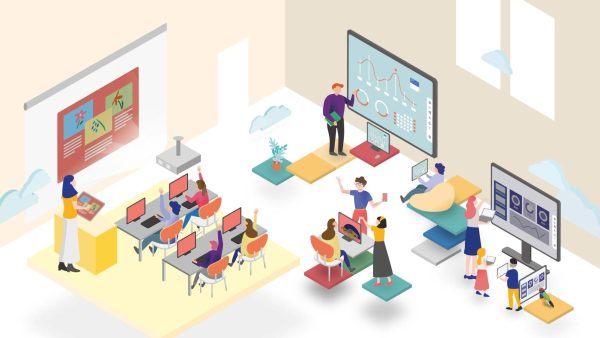Harming or helping humans?
While walking in the Jenison hallways, you get a glimpse of kids on their way to their next destination. Heads facing down, glowing reflection on their faces from texting their peers, listening to music and even making phone calls.
Phones appear to be every teens shadows everywhere they go. Technology’s existence for several years shows impacts on every user. While using all the different types of technology, it can come with downfalls from the mental and physical standpoint.
With children spending so much time on their electronics scientific evidence shows that putting your phone away and out of arm’s reach can result in positive outcomes. “It takes time and practice to develop those skills,” said Jean Twenge, a psychology professor at San Diego State University. This is not an overnight issue you can sleep off. Ignoring your phone takes time, and perseverance to actually make a difference.
According to a tracking app called Moment,, the average American spends four hours a day staring at their smartphone and keeps it within arm’s reach at all times.
Research shown from InnerDrive (a mindset coaching company working in education) shocks us. They say that being on your phone for too long can result in lower your concentration. You start to have a fear of missing out (FOMO). It can reduce your memory and warps the view of reality. High stress and anxiety levels make you sleep worse. Schools have brought this into consideration and decided to make a change in the way they run their schooling.
Paul Barnwell, a teacher and writer decided to speak out about his job. “Walking the hallways between classes at Fern Creek High School in Louisville, Kentucky, I dodge students whose heads turned down onto glowing screens. Earbuds and bright colored headphones are everywhere. And when I peer into classrooms, I see students tuning out their peers and teachers and focusing instead on YouTube and social media. There needs to be a change!”
Oxford learning center By banning cellphones, Ontario’s Education Ministry hopes to remove distractions so students can focus on acquiring foundational learning skills they need, including reading, writing, and math.
If you’re in any type of social setting whatsoever, the chances are that a majority of the people you see on their phones. But when we part from our technology positive outcomes can occur. Justin Stenstrom, National-Acclaimed Life Coach, spoke out about the issue. he shares that more people need to know what life is like “phone-less”. He informs us that “I become more productive, I become more social, I am less stressed, I live in the moment, I live in reality, not in a virtual world, my relationships are better with others, I feel more empowered and I am happier”.
The study published in the journal Computers in Human Behavior, found cell phones tended to reduce attention and memory. Schools have gone out of their way to completely ban phones from the school building and classroom. Schools make investments on purchasing a “wall pocket” for every student in the classroom. Their phones sit in the pocket from the beginning of class and not receive it until classes get dismissed. With our phones being in a close proximity it gives us anxiety. We get the urge to turn our phones over and check to see if we have a new notification.

Taylor Maciejewski is a Senior at Jenison High School. She likes to be involved in creating the School Yearbook as well as taking pictures. On her free...





